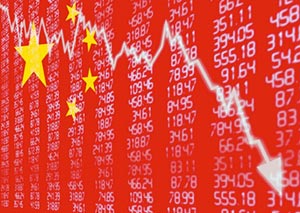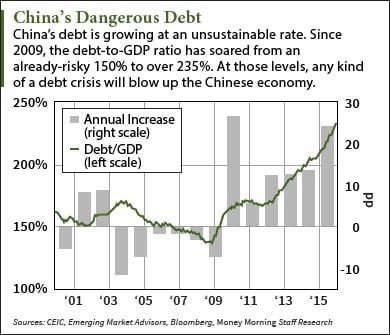The Chinese government has engineered a global stock market crash that could strike at almost any time, but at most is no more than a few years away.
It would be easy (although incorrect) to assume this is part of a Beijing master plan.
After all, we know the Chinese embrace long-term plans to manage their economy;  they've used five-year plans since the 1950s. And we know China has spent years building up its gold reserves.
they've used five-year plans since the 1950s. And we know China has spent years building up its gold reserves.
The strategy here would be to trigger a global stock market crash to take down the world economy while relying on the gold as protection from the worst of it. When it's over, China emerges as the world's dominant economy by far.
No doubt Chinese officials wish they could pull something like that off. But the truth is far more frightening.
You see, China has engineered a global stock market crash, but not intentionally.
The mixing in of bits of capitalism into what was once a centrally controlled economy, the very formula that brought 30 years of stunning growth and prosperity to China, is now on the verge of an implosion.
China Fears a Global Stock Market Crash, Too
"It's nothing the Chinese would ever want. They actually have the most to lose, by far, in a global rout," explained Money Morning Capital Wave Strategist Shah Gilani.
In fact, Chinese officials are frantically trying to prevent a global stock market crash. But it's a battle they can't win.
Before I go into detail on why China is in such deep trouble, however, it's important that investors understand that a crisis in China invariably puts global markets at risk.
Remember, China is the world's second-largest economy, and catching up quickly to the United States.
What's more, China holds a pivotal position in the world economy. It's the world's largest consumer of most commodities, including coal, aluminum, nickel, and copper.
China is also the world's biggest exporter of goods, a title it has held since 2009. And it's the third-biggest importer, behind the United States and the European Union.
Now this economic giant is in the throes of a crisis of its own making and can't avoid it without suffering serious financial damage.
Here's how China's situation got so dire...
Why China Has Become a Financial Powder Keg
[mmpazkzone name="in-story" network="9794" site="307044" id="137008" type="4"]
One way to understand just how bad things are in China - and why it has the potential to trigger a global stock market crash - is to view it as an example of a phenomenon called a "Minsky moment."
First used to explain the Asian Debt Crisis of 1997, a Minsky moment essentially describes the collapse of a credit-fueled bubble. Or, as Investopedia puts it, "A Minsky moment is based on the idea that periods of speculation, if they last long enough, will eventually lead to crises; the longer speculation occurs the worse the crisis will be."
The phases of a Minsky moment are displacement (when investors get excited about something), boom, euphoria, profit-taking, and panic.
A typical example would be the housing bubble of 2003-2007. The low cost of borrowing set off a speculative boom in housing prices. People took on ever-greater risks to borrow money, driving prices to crazy levels. When the bubble collapsed, it took down the U.S. economy and triggered the worst stock market crash since the Great Depression.
And that brings us back to what's been happening in China, which is on the brink of its own Minsky moment...
Why China's Soaring Debt Is Headed for a Minsky Moment
While the 2008 financial crisis was crushing markets in the United States, Europe, and elsewhere, the Chinese government was frantically maneuvering to minimize its impact at home.
So the government borrowed and spent while encouraging businesses and individuals to borrow and spend in a frenzied effort to support China's double-digit growth rate despite a tepid global environment.
Between 2007 and 2014, China's total debt ballooned from $7 trillion to $28 trillion. According to a McKinsey study released last year, that represented more than one-third of global growth in debt.
And borrowing by non-financial corporations, including developers, drove much of that debt. It was fueled partly by risky "shadow banking" practices, which often involved non-bank loans between companies. These loans were bundled as trust or wealth-management products and sold as investments.
The problem is that China's slowing economic growth in the last few years has put pressure on many companies to the point where they're struggling to make their debt payments.
So far the Chinese government has mostly avoided defaults either by arranging bailouts or, if you can believe this, permitting more borrowing. New loans in China soared to a record last year.
When you're borrowing money to pay off debt, it's only a matter of time before the wheels come off the cart.
But even with all the crazy financial engineering, non-performing loans - that is, bad loans - increased by 50% from December 2014 to December 2015. And BOC International predicts bad loans in China will triple over the next two years, from 1.67% at the end of last year to 6.6% in 2018.
China Can't Hold Off the Crisis Much Longer
"We will likely see a wave of bankruptcies and restructurings when the interest coverage ratio drops further," Xia Le, chief economist for Asia at Banco Bilbao Vizcaya Argentaria SA (NYSE ADR: BBVA), told Bloomberg. "Return on assets for Chinese companies has been declining due to rising debt. Profitability is also slowing due to overcapacity in many sectors, which has weakened the ability of companies to repay their debts."
And as more companies struggle, credit is likely to tighten. That will cause more cash flow problems, putting more companies at risk of default and leading to a vicious cycle.
"The Chinese authorities have given up even trying to get a handle on the country's spiraling debt problem. This means that a financial crisis and severe growth downturn are likely by 2020," analyst Jonathan Anderson wrote in Gavekal's China Economic Quarterly.
The credit agencies also are growing skeptical of China's ability to cope with its debt. Both Moody's and Standard & Poor's lowered China's credit rating last month from "stable" to "negative."
For the immediate future, expect Chinese officials to keep their heads in the sand. Desperate to avoid any economic pain, they'll let the debt bubble continue to inflate - until it inevitably collapses and triggers a global stock market crash.
"I am deeply worried about the Chinese economy in the medium- and long-run and do not see a way out," Vincent Chan, head of China research at Credit Suisse Group AG (NYSE: CS), told the South China Morning Post.
Follow me on Twitter @DavidGZeiler or like Money Morning on Facebook.
Protect Your Money: You don't want to wait for China to set off a global stock market crash to start thinking about how to preserve your money through the financial storm. Fortunately, Money Morning Global Credit Strategist Michael Lewitt has come up with an investment that will protect your cash when the markets start to get ugly...
Related Articles:
- Bloomberg: It's Never Been This Hard for Chinese Debtors to Pay Interest
- Bloomberg: China Faces a Debt Crisis. Or Does It?
- South China Morning Post: Chinese Debt Growing Faster Than the Economy
About the Author
David Zeiler, Associate Editor for Money Morning at Money Map Press, has been a journalist for more than 35 years, including 18 spent at The Baltimore Sun. He has worked as a writer, editor, and page designer at different times in his career. He's interviewed a number of well-known personalities - ranging from punk rock icon Joey Ramone to Apple Inc. co-founder Steve Wozniak.
Over the course of his journalistic career, Dave has covered many diverse subjects. Since arriving at Money Morning in 2011, he has focused primarily on technology. He's an expert on both Apple and cryptocurrencies. He started writing about Apple for The Sun in the mid-1990s, and had an Apple blog on The Sun's web site from 2007-2009. Dave's been writing about Bitcoin since 2011 - long before most people had even heard of it. He even mined it for a short time.
Dave has a BA in English and Mass Communications from Loyola University Maryland.



